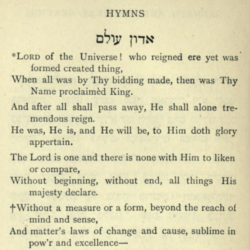Contributor(s): Shared on: 12 March 2021 under the Creative Commons Zero (CC 0) Universal license a Public Domain dedication Categories: Tags: | Source (Hebrew) | Translation (English) |
|---|
אֲדוֹן עוֹלָם אֲשֶׁר מָלַךְ
בְּטֶֽרֶם כׇּל־יְצִיר נִבְרָא׃
לְעֵת נַֽעֲשָׂה כְּחֶפְצוֹ כֹּל
אֲזַי מֶֽלֶךְ שְׁמוֹ נִקְרָא׃
|
The Lord of all was sovereign King,
Ere aught that is was moulded;
Now that all nature stands in pride,
The world display his kingdom. |
וְהוּא אֶחָד וְאֵין שֵׁנִי
לְהַמְשִׁיל לוֹ לְהַחְבִּירָה׃
בְּלִי רֵאשִׁית בְּלִי תַּכְלִית
וְלוֹ הָעֹז וְהַמִּשְׂרָה׃
|
And he is one, beside him none,
With none he shares his glory;
Has no beginning and no end,
His are the power and kingdom. |
וְהוּא אֵלִי וְחַי גּֽוֹאֲלִי
וְצוּר חֶבְלִי בְּיוֹם צָרָה׃
וְהוּא נִסִּי וּמָנוֹס לִי
מְנָת כּוֹסִי בְּיוֹם אֶקְרָא׃
|
He is my God, my Savior he,
My Rock, my Stay in anguish;
He is my refuge and my flag,
My cup, my share forever. |
בְּיָדוֹ אַפְקִיד רוּחִי
בְּעֵת אִישַׁן וְאָעִֽירָה׃
וְעִם רוּחִי גְּוִיָּתִי
אֲדֹנָי לִי וְלֹא אִירָא׃
|
Unto his hand I trust my soul,
When sleeping, when awaking,
And with my soul my body’s frame;
He is with me, I fear no evil. |
Adon Olam is a piyyut that became popular in the 15th century and is often attributed to Solomon ibn Gabirol (1021–1058) and less often to Sherira Gaon (900-1001), or his son, Hai ben Sherira Gaon (939-1038). The variation of the piyyut appearing here is adapted from the abridged arrangement of Rabbi Benjamin Szold translated by Rabbi Marcus Jastrow, “The Lord of All,” as found in Songs and Prayers and Meditations for Divine Services of Israelites (1873), p. 26-27. Hebrew source set side-by-side with the English translation by Aharon Varady. Source(s)
Marcus Jastrow (June 5, 1829, Rogoźno – October 13, 1903) was a Polish-born American Talmudic scholar, most famously known for his authorship of the popular and comprehensive A Dictionary of the Targumim, Talmud Babli, Talmud Yerushalmi and Midrashic Literature. He was also a progressive, early reformist rabbi in America. Along with Benjamin Szold and Frederick de Sola Mendes, Marcus Jastrow was characterized by Jewish historian Jacob Rader Marcus as being on the right-wing of early American Reform. His translation of Rabbi Benjamin Szold's prayerbook into English offered a more traditional alternative to the Minhag America prayerbook of Isaac M. Wise. He opposed the 1885 Pittsburgh Platform, but consented for an organ to be installed in his Rodeph Shalom synagogue in Philadelphia.  Benjamin Szold (November 15, 1829 in Nemeskürt, Nyitra County, Kingdom of Hungary, (today Slovakia) – July 31, 1902 in Berkeley Springs, West Virginia) was an American rabbi and scholar. Szold studied under Rabbis Jacob Fischer of Shalgaw, Wolf Kollin of Werbau, and Benjamin Wolf at the Pressburg Yeshiva, and received the rabbinical authorization from Judah Assod of Bur and Simon Sidon of Tyrnau. In 1848, he studied in Vienna, but when the revolution of that year broke out he went to Pressburg. From 1849 to 1855 he tutored in private families in Hungary, and in the latter year entered the University of Breslau, where he remained until 1858. While a student he officiated during the holy days at Brieg, Silesia (1857), and at Stockholm, Sweden (1858). In 1859, he accepted a call from the Temple Oheb Shalom (Baltimore, Maryland) in whose service he remained until his death, first as rabbi and later (after 1892) as rabbi emeritus. Under his guidance it grew rapidly, and, actuated by his example, it became widely known for its strict observance of Shabbat. Before Szold's arrival the congregation had adopted for use in its Shabbat service the Minhag America, (which was the new prayer-book written by Isaac Meyer Wise, a Reform rabbi) on the great fall holy days it reverted to the Minhag Ashkenaz; after much discussion with his congregation Szold introduced a new prayer-book, Abodat Yisrael, which closely followed traditional lines. Shlomo ibn Gabirol (also Solomon ben Judah; Hebrew: שלמה בן יהודה אבן גבירול, Arabic: أبو أيوب سليمان بن يحيى بن جبيرول Abu Ayyub Sulayman bin Yahya bin Jabirul, Latin: Avicebron or Avencebrol; 1021/22-1058), born in Malaga, Spain was an Andalusian poet and Jewish philosopher. He published over a hundred poems, as well as works of biblical exegesis, philosophy, ethics, and satire. Aharon Varady (M.A.J.Ed./JTSA Davidson) is a volunteer transcriber for the Open Siddur Project. If you find any mistakes in his transcriptions, please let him know. Shgiyot mi yavin; Ministarot naqeni שְׁגִיאוֹת מִי־יָבִין; מִנִּסְתָּרוֹת נַקֵּנִי "Who can know all one's flaws? From hidden errors, correct me" (Psalms 19:13). If you'd like to directly support his work, please consider donating via his Patreon account. (Varady also translates prayers and contributes his own original work besides serving as the primary shammes of the Open Siddur Project and its website, opensiddur.org.) Read a comment / Leave a comment (moderated) Works of related interest: |







Leave a Reply